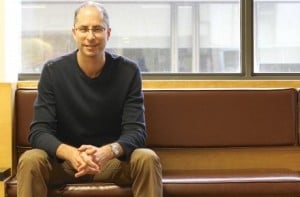This professor instills the philosophy of medicine
Mark Goldszmidt earns 3M National Teaching Fellowship
Goldszmidt (Paul Mayne)
Share

Mark Goldszmidt, a professor at the Schulich School of Medicine and Dentistry at Western University, is a 3M National Teaching Fellowship recipient for 2013. Maclean’s On Campus is profiling all 10 in the coming weeks.
In 1999, when Mark Goldszmidt was a postgraduate medical student at Western, he took a one-day course on teaching with Dr. Wayne Weston. “At the end of the workshop he stuck around,” says Weston, an emeritus professor of family medicine, “and had a lot of insightful questions and suggestions.”
It was the beginning of more than a decade of collaboration between the two, and a classic Goldszmidt move. “I always see the gaps, and the ways it could be better,” says Goldszmidt, an associate professor of medicine who teaches a spectrum of students, from undergraduates to faculty. He has revamped other classes, created new ones, and when he saw a bigger need for innovation in medical education, he helped found the Centre for Education Research & Innovation.
Goldszmidt calls Weston a mentor, but Weston says it was the other way around. “I feel I learned more from him than he did from me,” he says. “I’ve never had another student at any level with as much insight about education or as much passion and energy to make it as good as it can be.”
Goldszmidt’s passion—like that of all good doctors—stems from the belief that he can help people. And he tries to instill in students that overarching goal. The study of medicine may be a science, but the practice, he says, is philosophical. “The most important part I try to teach the students is: ‘I’m here to help. I want to make a difference.’ Trying to get that across when they’re trying to learn the basics—all the data they’re supposed to collect, and learning mastery of the knowledge base— is a really big challenge.” But when students believe “that what I do matters,” it drives their learning.
Goldszmidt teaches students to think about medicine as a collaboration—not just with other health professionals, but with the patients themselves. “If you’re really trying to help patients, you have to, by the end of the encounter, say, ‘Me and my patient see eye to eye on what the goals are, what the problem is.’” It’s not about following a script of questions. “Instead you’re listening,” he says, “you’re listening to what they have to say.”
When undergraduates work with Goldszmidt in a clinical setting, some find it intimidating. “Each student has the potential to achieve really highly in the clinical environment, and I demand it of them.” In medicine, good isn’t good enough. Goldszmidt wants excellence.
As a result, “I am one of those teachers who, probably, some people really just love, and other people find that I take getting used to.” Those high standards come with plenty of one-on-one feedback. By the end of a week on clinical rotation with him, many students tell him that they “got it,” he says. “I helped them see how they could do it better.”